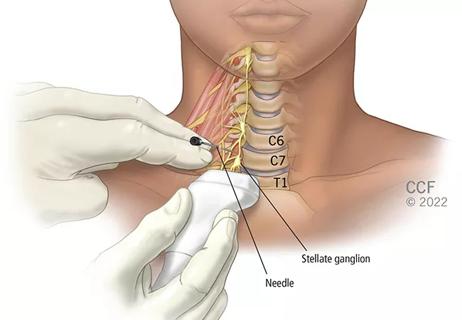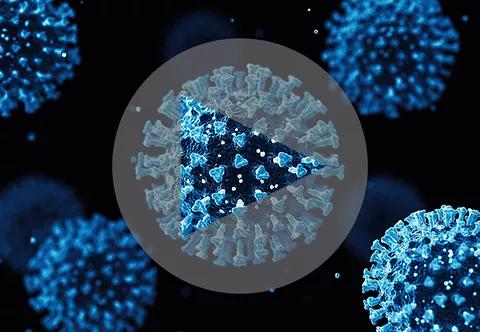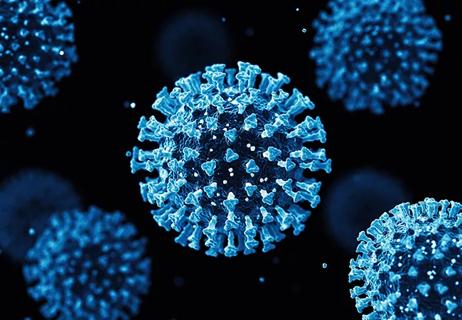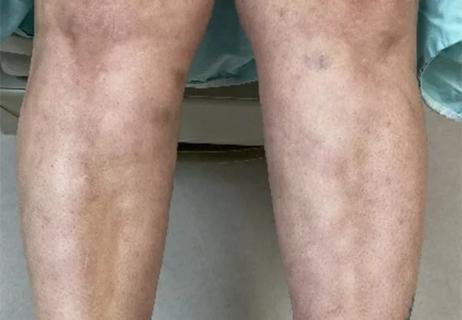Black race, COVID-19 hospitalization and mood symptoms confer increased risk, study finds

Moderate to severe sleep disturbances are highly prevalent among patients with post-acute sequelae of COVID-19 (PASC), or “long COVID.” So finds a Cleveland Clinic retrospective analysis presented at the American Academy of Sleep Medicine’s SLEEP 2022 meeting on June 6. [Editor’s note: The study was published in full in the Journal of General Internal Medicine on April 4, 2023.]
Advertisement
Cleveland Clinic is a non-profit academic medical center. Advertising on our site helps support our mission. We do not endorse non-Cleveland Clinic products or services. Policy
“At least 40% of patients with long COVID reported moderate to severe sleep disturbances, and Black race was a leading factor associated with sleep disturbances in this population,” says the study’s first author, Cinthya Pena Orbea, MD, a staff physician in Cleveland Clinic’s Sleep Disorders Center.
“Sleep difficulties and fatigue are widely reported among patients with long COVID, but little is known about their severity in this setting and what may predict their development,” Dr. Pena Orbea notes. “So we leveraged data from Cleveland Clinic’s reCOVer Clinic for people with long COVID to further elucidate these associations.”
She and colleagues analyzed data collected from all reCOVer Clinic patients during the period February 2021 through April 2022 who completed the sleep disturbance and fatigue questionnaires from the validated Patient-Reported Outcomes Measurement (PROMIS) instrument. Scores were standardized and compared with the general U.S. adult population on a T-scale of 50 ± 10. Scores ≥ 60 indicate moderate disturbance, and those ≥ 70 signal severe disturbance.
Patients’ demographic and clinical factors were determined from the electronic health record and analyzed using multivariable logistic regression to determine factors associated with sleep disturbances.
Dr. Pena Orbea emphasizes that the study assessed patient-reported sleep disturbances — relating to sleep quality and satisfaction, restoration, and sleep depth — rather than the prevalence of diagnosed sleep disorders.
Advertisement
To be eligible for treatment in the reCOVer Clinic (and thus for inclusion in the study), patients had to have PASC, defined as a positive PCR test for SARS-CoV-2 and ongoing or new symptoms of COVID-19 at least 28 days after their positive test result.
Overall, 962 patients with PASC seen at the reCOVer Clinic completed the PROMIS sleep disturbance questionnaire. These patients were predominantly female (74.9%) and had a mean age of 49.6 years; their racial breakdown was 81.9% white, 13.0% Black and 5.1% other races. The mean (± SD) T-score on the sleep disturbance questionnaire was 57.8 ± 8.4, with 41% of patients reporting at least moderate sleep disturbances and 8% reporting severe sleep disturbances.
On the PROMIS fatigue questionnaire, these patients had a mean T-score of 62.7 ± 9.1, with 67% of patients reporting at least moderate fatigue and 22% reporting severe fatigue.
Analysis showed that, compared with patients with mild or no sleep disturbances, those with moderate to severe sleep disturbances were significantly more likely to be Black, to have been hospitalized for COVID-19, and to have fatigue and mood disorders.
On multivariable analysis adjusting for other factors, Black race remained significantly associated with moderate or severe sleep disturbance (odds ratio =1.54; 95% CI, 1.02-2.32), as did hospitalization for COVID-19 (odds ratio = 1.53; 95% CI, 1.12-2.09). Age, sex and body mass index were not significantly associated with sleep disturbance severity.
The investigators reported that their study did not assess the impact of vaccination against COVID-19 or infection with specific SARS-CoV-2 variants.
Advertisement
“Our research shows that the prevalence of moderate to severe sleep disturbances among patients with long COVID is very high and is associated with Black race, hospitalization for COVD-19 and mood symptoms,” Dr. Pena Orbea observes. “Notably, Black race conferred a 50% increase in the odds of developing these disturbances. This underscores the need to understand the mechanisms or pathways behind the association of sleep disturbances with long COVID so we can develop targeted interventions for specific patient populations.”
This study is the first investigation Dr. Pena Orbea is aware of to report findings that characterize sleep disturbances among patients with PASC, although she says several other studies are ongoing. She expects that subsequent research will aim to elucidate why some patients with PASC have heightened risk of sleep disturbances.
Future research may also assess the prevalence of sleep disorders among patients with PASC, in contrast to this study’s focus on self-reported sleep disturbances. Dr. Pena Orbea notes that, based on her observations of patients in Cleveland Clinic’s reCOVer Clinic, the most common sleep-related complaints in this population include nonrestorative sleep, fatigue, brain fog, restless sleep and insomnia.
Advertisement
Advertisement

Patients report improved sense of smell and taste

Clinicians who are accustomed to uncertainty can do well by patients

Unique skin changes can occur after infection or vaccine

Cleveland Clinic analysis suggests that obtaining care for the virus might reveal a previously undiagnosed condition

As the pandemic evolves, rheumatologists must continue to be mindful of most vulnerable patients

Early results suggest positive outcomes from COVID-19 PrEP treatment

Could the virus have caused the condition or triggered previously undiagnosed disease?

Five categories of cutaneous abnormalities are associated with COVID-19